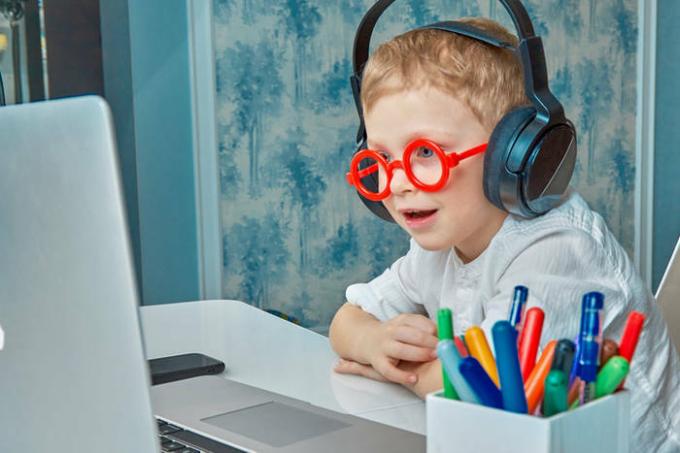What are flexible skills and how can they be developed in a child? How will gadgets help with this? The best technique for developing soft skills in children from 4 to 12 years old
Many parents have heard about soft skills - a set of skills that a modern person needs for a successful future. However, few people fully understand what these skills are, and even more so, how to develop them in a child. Usually we delegate this task to the school, because it is there, in theory, that we have to teach children everything that is useful in adult life. But our education system (even taking into account a dozen new school programs) is not at all aimed at developing soft skills. These skills should be instilled in the child by the parents, and it is best to start from early childhood. We will try to figure out how to do this and what can help with this.
What are soft skills and why are they so important?

Schools pay little attention to developing agile skills / istockphoto.com
To begin with, soft skills are not something out of the ordinary. To a greater or lesser extent, this skill set is present in every person (and yes, our grandmothers too). However, a specific theory * about this was invented and scientifically formalized only in 2008. Scientists have divided human skills into two categories - hard skills and soft skills.
Hard skills (literally "hard skills") - this is heavy artillery, a baggage of professional knowledge with which a person comes to get a job. This is what is taught in schools, and then in universities. Simply put, this is the specialization of a particular employee and his skills in a particular area. For example, hard skills for a lawyer is knowledge of codes and laws. For a designer - the ability to work in graphic programs. For a programmer - knowledge of programming languages.
Soft skills (literally "flexible skills") is something completely different. These include the so-called "over-professional" skills that help a person to work with other people, quickly learn new things, find ways to solve non-standard problems, correctly time and evaluate your strength. Taking into account the fact that knowledge (hard skills) in the modern world becomes obsolete very quickly, without flexibility (soft skills) a person loses their qualifications.
Basic soft skills a child needs

One of the basic agile skills is self-organization / istockphoto.com
What does this theory have to do with the child? The trick is that the hard skills that children are diligently stuffed in educational institutions do not work by themselves. By the time the child finishes school, and then the university, his knowledge will lose half its relevance. That is why excellent students who have been cramming the rules and formulas for many years find it so difficult to get settled in life: the luggage is outdated, and no one needs it anymore.
This is where flexible skills come to the fore. It is they who help to quickly navigate the situation and fill in the gaps that prevent success. There are quite a few such skills, but they can all be divided into several main categories:
- Communication skills. Perhaps the only thing that many people know about soft skills is the ability to communicate. But communication skills do more than just become the life of the company. These skills include the ability to negotiate and work in a team, defend and explain your position, control your emotions and show leadership qualities.
- Self-organization skills. This is what the adult world calls time management. Self-organization helps you manage your time correctly, highlight the main thing and filter out the unnecessary, focus on what is important at the moment, and organize yourself for work.
- Self-learning skills. First of all, this is the desire to learn something new - independently, without giving and prompting from others. A person capable of self-learning can improve their skills in any situation.
- Information skills. These skills include basic computer literacy and the ability to “float” in the flow of information. Today it is important not to “memorize” information, but to be able to find and analyze it. The more confident a person feels in a digital environment, the more benefit he can derive from it.
- Creative skills. This is the ability to think outside the box and find non-standard ways of solving problems. It is directly related to logic and outlook, attention to detail and creative thinking (which, by the way, is not yet welcomed in schools).
How to develop agile skills easily and organically?

Gadgets to help children develop flexible skills / istockphoto.com
The sooner you start developing soft skills in a child, the easier and easier it will be for him in adulthood. After all, knowledge, with a strong desire, can be obtained after school, but flexible skills are more related to personal qualities that need to be developed from childhood. How to make them develop naturally and organically in a child? First of all, you need to surround it with the right information environment.
The most understandable, accessible and, what can we hide, the process of obtaining information, pleasant for a modern child, is gadgets. No matter how much we would like, they are common and commonplace for our children. And this is not so bad, because the same computer literacy of a current student is already an order of magnitude higher than that of a middle-aged person. You just need to choose the right content that will help your child develop soft skills gently and carefully. And educational programs and applications are best suited for these purposes.
According to statistics **, today's children from 5 to 16 years old spend about 5 hours a day behind the screen of phones and tablets. They spend most of their time playing games, watching YouTube videos, and socializing on social media. If you devote at least part of this time to the educational program, you will be surprised at the child's progress within a couple of weeks.
Which application to choose for the development of soft skills?

Choosing a good learning app isn't easy / istockphoto.com
You can download an educational program to your phone and make your child study in it every day. However, it is unlikely that you will pump some skills in this way. Rather, cause rejection and negativity. The program should interest the little user to such an extent that he himself would like to enter it again and again. Mini-applications for 20-30 tasks are not suitable for these purposes. It should be a large educational platform developed by methodologists, psychologists and professional designers.
Today, one of the best in this regard is the web platform. "LogicLike". Now more than 2 million are engaged in it. users per month. This is not just a mobile application for a certain age: the platform is designed for children from 4 to 12 years old, that is, it can offer a child systematic and continuous learning.
The basic course of the platform is aimed at developing logic, mathematical abilities, memory and attention. Only it contains more than 2000 tasks - these are puzzles, and numerical puzzles, and patterns, and attention to detail (more than 20 different types of tasks in total). However, besides him, there are several dozen other courses on various topics. Preschoolers and younger students will be interested in courses about pets, planet Earth, continents and their inhabitants. Older children will definitely like the interactive tasks in chess, sudoku, kakuro, olympiad logic. And everyone, without exception, including moms and dads, will benefit from taking the Cybersecurity course.
What can LogicLike teach a child?

With LogicLike, the child will be engaged without the parental request / istockphoto.com
To begin with, on this platform, the child does not need to be "forced to learn." Not only are all the tasks interactive, presented in a playful way, there are many of them and they do not have time to get bored. The system of bonuses and motivation has been perfectly and consistently worked out here. An asterisk is assigned for each solved problem. They need to be collected to unlock a character from special collections. And the final of the training will be a personalized certificate, which can be printed and solemnly awarded to the child.
This encourages children to study on their own, without parental reminders. The more activities, the more self-study skill becomes a habit. In addition, the skill of self-organization is developed: after all, the child himself allocates time for classes in the program, while he can "sacrifice" some kind of entertainment such as shooters or videos in TikTok.
"LogicLike" easily and unobtrusively develops the child's creative skills and flexibility of thinking. In each course of the platform, tasks are arranged in ascending order, from simple to advanced. That is, children, on the basis of an already solved problem, try to find a solution to a more complex one. This makes learning on the platform as effective as possible and keeps attentiveness and memory in good shape. And additional courses, on top of everything, also develop horizons.
How is LogicLike useful for parents?

Parents can monitor their child's progress in LogicLike / istockphoto.com
This platform is one of the few with which you can leave your child, as they say, "one-on-one."
- First, there are no ads here.
- Secondly, the tasks are clearly thought out taking into account the child's age. If he performs them consistently and systematically, he will definitely not need the help of adults.
- Thirdly, there are no stress factors here. The child is engaged in a comfortable mode. And if the answer is wrong, he is asked to think about it and choose another option. If difficulties arise, there are hints and explanations. At the same time, everything is presented as correctly as possible, which allows the child to develop independence in decision-making.
It is also important that you can track your child's progress: all errors are saved in the account data. That is, you can understand what types of tasks cause the greatest difficulties, and, if you wish, purposefully work out in this direction. For example, a child is not guided the first time who is superfluous in a certain row, which means that it is worth paying attention to the signs of objects. Or there are errors in numerical puzzles, which means that you need to "pull up" the mathematics.
In addition, there is a ton of interesting and useful information for adults on the platform. Here you can find advice from methodologists and teachers on child development, read the recommendations of psychologists on how to teach a child to set goals, how to captivate him with studies, or how to train memory. There are also excellent collections of educational games and activities for children of different ages that you can do without being tied to the platform. Importantly, all information is proven expert opinions.
WITH "LogicLike" a comprehensive child development assistant is at your disposal. Here he will develop logical and mathematical thinking, as well as form the skills of self-organization, work with information and significantly expand his horizons. And most importantly, he will do it with pleasure. And this is exactly how, with comfort and result, the development of the child should take place.
* article "Graduate Employability,‘ Soft Skills ’Versus‘ Hard ’Business Knowledge: A European Study” in Higher Education in Europe (2008)
** Connected Kids report by Childwise Research Company
You will also be interested in reading:
Thinking outside the box: how to harmoniously develop a preschooler
How to develop your child's intelligence with coordination exercises




